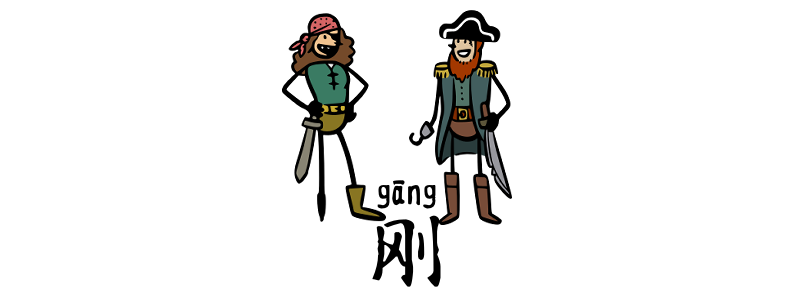Grammar Points:
The words “刚 gāng” and “刚刚 gānggāng” are used to indicate an action that has just happened a short while ago. However, there are some subtle differences in their meanings and usage:
剛/刚 gāng
It is an adverb that can only be used before a verb or adjctive and after a subject. It emphasizes that an action has just happened or that something is just about to happen.
The funny thing is “刚 gāng” can be used to indicate an event that occurred in the past, present, or even future. Therefore, the concept is more focused on the time frame, specifically a short period of time, rather than the tense.
- Past:
他昨天剛到北京他昨天刚到北京
He just arrived in Beijing yesterday.
- Present:
我剛出門我刚出门
I just went out.
- Future:
你剛到學校的時候一定要跟老師打招呼你刚到学校的时候一定要跟老师打招呼
You must say hello to the teacher when you just (first) arrive at school.
你剛去見誰?你刚去见谁?
Who did you just go see?
天剛晴天刚晴
The weather just cleared up.
我剛買了新手機我刚买了新手机
I just bought a new cellphone.
她的狗剛死,現在她沒心情去夜店她的狗刚死,现在她没心情去夜店
Her dog just died, so she’s not in the mood to go to the nightclub now.
他剛走了三天他刚走了三天
He left only three days ago.
Common Mistakes
剛我在咖啡店買咖啡刚我在咖啡店买咖啡 ❌
I bought coffee at the cafe just now.
(An adverb need to be placed after the subject.)
剛的咖啡加了糖嗎?刚的咖啡加了糖吗? ❌
The coffee we had earlier had sugar in it?
(An adverb can not place in front of 的 de)
我剛沒喝咖啡我刚没喝咖啡 ❌
I didn’t drink coffee just now.
(There is no negation for 剛 gāng in Mandarin Chinese. Buuut some Taiwanese do say it.😅)
我剛吃飽了我刚吃饱了 ❌
I just finished eating.
(Since 刚 gāng is used to describe an action that has just happened in a short period of time, its meaning is in contrast to the particle 了2 le, which indicates a change of state. Therefore, it is not necessary to use 了2 le with 刚 gāng.)
剛剛/刚刚 gānggāng
刚刚 gānggāng is much more flexible as it can function as both an adverb or a time noun, allowing for more freedom in its placement within a sentence. When use 刚刚 gānggāng implies a slightly longer duration of time and indicates that an action or event has occurred in the recent past or present, but not future.
However, the phrase ‘slightly longer duration of time’ is subjective, so it’s not necessary to distinguish between the two terms. If you always use 刚刚 gānggāng, you won’t be wrong.
他剛剛決定放棄學中文了他刚刚决定放弃学中文了
He just decided to give up learning Chinese.
你不是剛剛到中國,為什麼到現在一個朋友也沒有你不是刚刚到中国,为什么到现在一个朋友也没有
You didn’t just arrive in China. Why haven’t you made any friends yet?
剛剛你說的那句話是什麼意思?刚刚你说的那句话是什么意思?
What did you mean by the sentence you just said?
我剛剛沒說話我刚刚没说话
I didn’t say anything just now.
剛剛的菜有點辣,可以給我杯水嗎?刚刚的菜有点儿辣,可以给我杯水吗?
The dish from earlier was a bit spicy. Could you give me a glass of water?
Common Mistakes
你剛剛到學校的時候一定要跟老師打招呼你刚刚到学校的时候一定要跟老师打招呼 ❌
You must say hello to the teacher when you just (first) arrive at school.
(Do not use it in future.)


